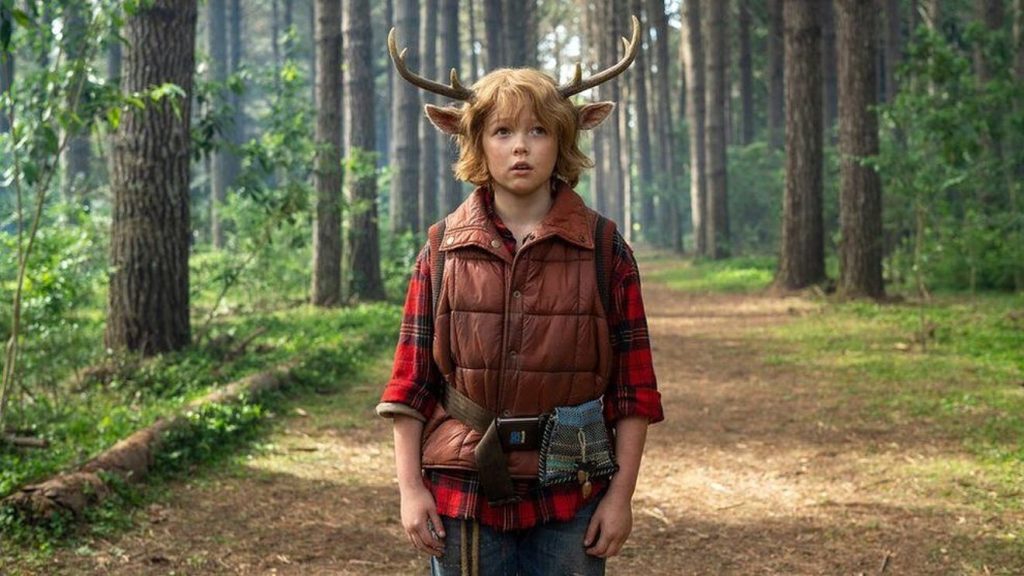* البشر هم طاعون وتعزيز من قيمة الهجينة بين الإنسان والحيوان 🐍
* لقد قضى فيروس مميت على الكثير من البشر، والناجون في خوف من العدوى لدرجة أنهم سيربطون كرسيًا ويحرقون أي شخص تظهر عليه أعراض المرض.
* لأن البشر سيئون ويدمرون الكوكب ، فإنهم يستحقون الموت. والثاني أن هذه الحيوانات الهجينة البشرية هي البديل الصحيح لها..
* بالنسبة لأولئك المشككين في أن عرض مثل Sweet Tooth هو دعاية ، تجدر الإشارة إلى أن المؤسس المشارك والرئيس التنفيذي الأول لشركة Netflix ، مارك راندولف بيرنايز ، هو ابن شقيق إدوارد بيرنايز ، وهو رائد دعاية رائد ومؤثر بشكل كبير (حرفيًا) لـ الحكومة والشركات الأمريكية. كتب إدوارد بيرنايز كتاب الدعاية ، والذي يمكن القول إنه العمل النهائي حول هذا الموضوع.
* إن التلاعب الواعي والذكاء بالعادات المنظمة وآراء الجماهير عنصر مهم في المجتمع الديمقراطي. أولئك الذين يتلاعبون بهذه الآلية غير المرئية للمجتمع يشكلون حكومة غير مرئية هي القوة الحاكمة الحقيقية لبلدنا. نحن محكومون ، وعقولنا مقولبة ، وأذواقنا تتشكل ، وأفكارنا مقترحة ، إلى حد كبير من قبل رجال لم نسمع بهم من قبل…. إنهم هم من يسحبون الأسلاك التي تتحكم في عقل الجمهور
* مثال عن تفكير النخب العالمية: منذ عام 1988 ، علق الأمير الراحل فيليب ، زوج الملكة إليزابيث الثانية ملكة بريطانيا العظمى ، لوكالة الأنباء الألمانية دويتشه بريس أجينتور ، “في حالة وجودي من جديد ، أود العودة كفيروس قاتل ، إلى تساهم بشيء ما في حل مشكلة الزيادة السكانية“.
* صحيفة USA Today’s Front Page Ad for Netflix’s Sweet Tooth to Scare Nation’s Grandparents تهيء الجماهير للإدخال العام للهجينة بين الإنسان والحيوان، من خلال تأطير المناقشة بمصطلحاتها ، لتدريبك على التفكير في مثل هذه الهجينة ليس كشيء وحشي ، ولكن كشيء لطيف ورائع. حلو.
تحت القشرة السكرية لـ Sweet Tooth توجد رسالة مفادها أن البشر يستحقون أن يقتلهم فيروس وأن يستبدلوا بهجائن بشرية وحيوانية.

Emily Mangiaracina (LifeSiteNews) – لقد قضى فيروس مميت على الكثير من البشر، وأصبح كل طفل يولد الآن جزءًا من الحيوانات ، ويعيش البشر الناجون في خوف من العدوى لدرجة أنهم سيربطون كرسيًا ويحرقون أي شخص تظهر عليه أعراض المرض. فيروس مميت.
هذه هي الخلفية لسلسلة Sweet Tooth من Netflix. يبدو العنوان تسمية خاطئة متعمدة لإبراز ، على النقيض من ذلك ، ظلمة القصة التي يسميها. وبالفعل ، فإن سلسلة الكتاب الهزلي الأصلية لعام 2009 من DC ، والتي تستند إليها ، قاتمة بشكل محبط.
بينما تحافظ سلسلة Netflix على النغمات المظلمة لعالم ما بعد نهاية العالم ، فقد أضاءت القصة بشكل كبير ، جزئيًا من الناحية التجميلية ، مع إعدادات جميلة من الغابات والحقول المضاءة بنور الشمس. لكن الحلاوة الحقيقية للعرض تأتي من سحر الشخصية الرئيسية ، جوس ، صبي هجين من الغزلان البشري لا يمكن التعرف عليه إلا من خلال أذنيه وقرونه. إنه يجسد الصبا البريء بشكل محبب لدرجة أنك تريد أن تتبناه على أنه ملكك.
عند مشاهدة العرض ، من السهل معرفة سبب كونه المسلسل الأكثر شهرة على Netflix عند صدوره في يونيو. لا يقتصر الأمر على أن عالم ما بعد COVID-19 يمكن أن يرتبط بشكل مخيف بإخفاء الوجه والخوف من العدوى بين الشخصيات البشرية في العرض. والسبب أيضًا هو أن العرض يسحب قلبك بشخصيات محبوبة وعلاقات تبدو حقيقية وقابلة للتواصل.
لكن سرعان ما يكتشف المشاهد أن براءة ومحبة جوس يتم استغلالها لنقل الرسالة الشريرة الكامنة وراء العرض.
يستعد المشاهد لهذه الرسالة في بداية العرض ، مع تفشي الوباء. كما يقول راوي العرض: “بينما انزلق العالم إلى الفوضى ، كان هناك شيء آخر يحدث. شيء غير عادي. “
تحاول كلمة “غير عادية” إضفاء لمسة إيجابية على شيء يعتبره معظم الناس مزعجًا للغاية: ولادة هجينة بين الإنسان والحيوان لأزواج من البشر ، والتي تتزامن بشكل غامض مع تفشي الفيروس.
“لا أحد يعرف أيهما جاء أولاً. الفيروس أو الهجينة. لكن هذا السؤال سيصبح أكبر لغز في حياتنا “، كما يقول الراوي.
بعد لمحات من الفوضى النارية لتفشي الفيروس ، ينتقل العرض إلى المكان الذي يعيش فيه جوس الصغير مع والده في الغابة ، بعيدًا عن الحضارة. في حين أن جوس لديه آذان صغيرة من الغزلان وبراعم قرن الوعل ، فإنه يبدو ويتصرف مثل صبي بشري صغير من كل النواحي الأخرى ، وفوق كل ذلك ، فهو لطيف بشكل استثنائي.
لن يستغرق العرض وقتًا طويلاً حتى يضيء بطنه القاتم ، بعد أن تكون أنت المشاهد قد دفئ قلبك بمشاهد تعرض سحر جوس الصغير.
لم يمض وقت طويل على الحلقة الأولى ، فوالد جوس – الذي هو بكل ما يبدو رجلًا محترمًا يحب جوس بشدة – يشرح لجوس كيف ولماذا تغير العالم أثناء الوباء.
يقدم لج,س تفاحة في جرة. عندما ينظر جوس إليه عن كثب ، يمكنه رؤية النمل يزحف في البرطمان ليلتهم التفاحة.
قال له والد جوس باحتقار في صوته: “ذات مرة ، كان الأشرار يحكمون الأرض”. “يفعلون ما يريدون ، يأخذون من الكوكب. تماما مثل هؤلاء النمل. كانت أشياء جشعة. التدمير الذاتي. فقط خارج لأنفسهم. لذا فإن الطبيعة جعلت الجميع يمرضون. ومحت كل ما تستطيع“.
ثم تتوهج لهجته: “ثم حدثت معجزة. النوع الخاص بك. أطلقوا عليها اسم الهجينة. لا أحد يعرف من أين أتيت أو كيف. لكن الناس الذين تركوا يخافونك. لقد كانوا الآن أكثر بخلا ، وأكثر غضبا. لم يعجبوك لأنك كنت مختلفًا “.
إليكم ضربة مزدوجة لرسالة ، لها آثار شريرة للغاية لأن لديهم نظراء في العالم الحقيقي.
الرسالة الأولى – التي تكررت كثيرًا في هوليوود – هي أنه نظرًا لأن البشر سيئون ويدمرون الكوكب ، فإنهم يستحقون الموت. والثاني أن هذه الحيوانات الهجينة البشرية هي البديل الصحيح لها ، وأنها ليست جيدة مثل البشر فحسب ، ولكنها أفضل من البشر ، كما سيوضح العرض لاحقًا.
“الموافقة الهندسية” على التهجير؟
في المناورة المذهلة التي يتخصص فيها التلفزيون ، يتم دفع المشاهد إلى قبول هذه النظرة الإبادة الجماعية والمناهضة للإنسان من خلال التنويم المغناطيسي ، والطب التجريبي الذي تم تصميمه ليكون أكثر سلاسة مع الإدارة من قبل الشخصيات المتعاطفة. الدعاية هي أكثر ماكرة لأن الشخصيات محبوبة جدا.
بالنسبة لأولئك المشككين في أن عرض مثل Sweet Tooth هو دعاية ، تجدر الإشارة إلى أن المؤسس المشارك والرئيس التنفيذي الأول لشركة Netflix ، مارك راندولف بيرنايز ، هو ابن شقيق إدوارد بيرنايز ، وهو رائد دعاية رائد ومؤثر بشكل كبير (حرفيًا) لـ الحكومة والشركات الأمريكية. كتب إدوارد بيرنايز كتاب الدعاية ، والذي يمكن القول إنه العمل النهائي حول هذا الموضوع.
مارس إدوارد بيرنايز ، وهو نفسه ابن شقيق سيغموند فرويد ، تأثيرًا هائلاً على معتقدات الناس وحتى سلوكياتهم ، لا سيما في الولايات المتحدة ، وحصل على دعم جون دي روكفلر جونيور ، وروزفلت ، وآن هاريمان فاندربيلت ، زوجة ويليام كيسام فاندربيلت ، في وقت مبكر من حياته المهنية في جمع التبرعات لما أسماه “مسرحية دعائية حارب من أجل التثقيف الجنسي”.
ذهب بيرنايز للمساعدة في الترويج للحرب العالمية الأولى للأمريكيين الذين يعيشون في الداخل والخارج على أنها الحرب التي من شأنها أن “تجعل العالم آمنًا للديمقراطية” أثناء عمله في لجنة الإعلام الأمريكية. أطلق على هذا العمل اسم “الحرب النفسية“.
بعد ذلك، طبق تقنياته في المساعدة على تسويق السجائر للنساء – حتى عندما ألقى سجائر زوجته في سلة المهملات – وفي المساعدة في إقناع الأمريكيين بأن فلورة المياه آمنة ومفيدة.😉 ووصف الهدف من أساليبه بأنه “هندسة الموافقة”.
وبحسب ما ورد حظيت هذه التقنيات بإعجاب ومحاكاة من قبل الدعاية النازية جوزيف جوبلز.
ليس هناك شك في أن مارك راندولف بيرنايز ، المؤسس المشارك لـ Netflix ، يواصل إرث عمه العظيم ، والذي يجسده هذا الاقتباس من قبل بيرنايز سينيور:
إن التلاعب الواعي والذكاء بالعادات المنظمة وآراء الجماهير عنصر مهم في المجتمع الديمقراطي. أولئك الذين يتلاعبون بهذه الآلية غير المرئية للمجتمع يشكلون حكومة غير مرئية هي القوة الحاكمة الحقيقية لبلدنا. نحن محكومون ، وعقولنا مقولبة ، وأذواقنا تتشكل ، وأفكارنا مقترحة ، إلى حد كبير من قبل رجال لم نسمع بهم من قبل…. إنهم هم من يسحبون الأسلاك التي تتحكم في عقل الجمهور.
هل Sweet Tooth طريقة لـ “الموافقة الهندسية” ، كما كان سيصيغها كبار بيرنايز ، على أهداف تقليص السكان العالمية؟
إنه ليس العرض التلفزيوني الأخير الوحيد الذي يكون فيه الموت الجماعي بالفيروس موضوعًا مستمرًا. يكشف مسلسل يوتوبيا 2020 ، الذي انتهى تصويره في أكتوبر 2019 وتم إلغاؤه بعد موسم واحد فقط ، في الحلقة الأخيرة (تنبيه المفسد) أن عبقريًا مجنونًا “خلق أنفلونزا أثارت الطلب على لقاح لا يعمل ، “على حد تعبير شخصية واحدة استوعبت خطته. الشرير ، الذي لعبه جون كوزاك ، أدخل فيروسًا في اللقاح ، من أجل تعقيم الناس و “وقف التكاثر البشري لثلاثة أجيال”.
لطالما كان ما يسمى بالزيادة السكانية مصدر قلق لأثرياء العالم. شارك مقال نشرته صحيفة صنداي تايمز في لندن عام 2009 أن أقوى المليارديرات في العالم ، بمن فيهم بيل جيتس ، وديفيد روكفلر جونيور ، وجورج سوروس ، وأوبرا وينفري ، التقوا لمعالجة “الزيادة السكانية” ، والتي وصفها أحد الحضور بأنها أدت إلى “شيء مرعب للغاية أن كل فرد في هذه المجموعة اتفق على أنه يحتاج إلى إجابات كبيرة “.
بعد عام ، أعلن بيل جيتس في تيد توك أن اللقاحات ستساعد في إبطاء النمو السكاني ، إلى جانب الرعاية الصحية وخدمات الصحة الإنجابية ، دون أن يوضح كيف.
منذ عام 1988 ، علق الأمير الراحل فيليب ، زوج الملكة إليزابيث الثانية ملكة بريطانيا العظمى ، لوكالة الأنباء الألمانية دويتشه بريس أجينتور ، “في حالة وجودي من جديد ، أود العودة كفيروس قاتل ، إلى تساهم بشيء ما في حل مشكلة الزيادة السكانية“.
الهجينة بين الإنسان والحيوان: كائنات متفوقة؟
بينما يقود Sweet Tooth رسالة أعمق بأن البشر هم طاعون ، فإنه يعزز قيمة الهجينة بين الإنسان والحيوان. السبب وراء ذلك غامض بعض الشيء ، لكن الرسائل الموجهة للعرض ، والتطورات الواقعية ، والتجربة العامة من قبل Netflix تدفع المرء إلى التساؤل: لماذا؟
يربط العرض قيمة الهجينة بين الإنسان والحيوان بصفاتها المفترضة غير المستهلكة وغير المدمرة. تشرح إحدى الشخصيات المحبوبة للغاية في العرض ، وهي نوع من النموذج الأصلي للأميرة المحاربة ، لجوس حول منتصف السلسلة: “قبل الفيروس ، كانت الأرض تحتضر. لقد دمرها البشر ، وكبروا. كل ذلك من أجل احتياجاتهم الأنانية ، مما يتركنا بلا شيء“.
يرد غوس: “قال لي بوبا إن الأشرار أخذوا كل ما يريدون”.
“نعم. لقد فعلوا. أجابت. “هل تعلم أنه قبل ظهور الفيروس ، لم يكن الماء أزرق؟ هذا لأنهم ملأوه بالقمامة. السماء ايضا. ولكن بمجرد أن يولد أطفال مثلك ، يمكن أن تبدأ الأرض في التعافي. يمكنك العيش بدون أخذ. يمكنك إبقاء الأرض حية. وهذا هو سبب تعهدنا بحماية السيارات الهجينة دائمًا ، بغض النظر عن التكلفة “.
في وقت لاحق من العرض ، قالت بطلة أخرى للشرير الرئيسي فيما يتعلق بالهجن بين الإنسان والحيوان: “إنهم أفضل منا. افضل منك او مني إنهم الجزء الجيد منا. بدون تعقيدات. الطبيعة لا تريدنا العودة. لم نعطها أبدًا سببًا وجيهًا لإبقائنا متواجدين في المقام الأول “.
في الواقع ، يتوقف شر الأشرار في العرض جزئيًا على كراهيتهم للهجين. يعتقد الشرير الرئيسي أن الهجينة بحاجة إلى الإبادة ، وأنهم “طفرة ، آفة”.
ذهبت Netflix إلى حد تعويم “طفل طائر بشري” في لوس أنجلوس ، باستخدام روبوت نابض بالحياة وموجود في عربة أطفال كما لو كان طفلًا حقيقيًا. افتتح مقطع الفيديو بالسؤال: “هل العالم جاهز لاستقبال الهجينة؟“
تحدث ممثل Netflix عن هجين “الاستيقاظ” حيث اشتعلت دهشة المارة. في حين بدا الأطفال بشكل عام أكثر انفتاحًا وقليل من الضحك ، فإن التعبيرات الملتوية للعديد من البالغين تشير إلى أنهم كانوا مذعورين.

بعد ذلك ، نشرت صحيفة USA Today ، وهي الصحيفة الأكثر انتشارًا في الولايات المتحدة ، في عددها الصادر في نهاية الأسبوع لشهر يونيو ، كـ “إعلان” لـ Sweet Tooth ، وهو غلاف أمامي مزيف كتب عليه ، “الأطفال الهجين المولودون في جميع أنحاء الولايات المتحدة ،” مع العنوان الفرعي ، “يتفاعل العالم مع الجيل الجديد من الأطفال نصف البشر ونصفهم الحيواني بكل من الرهبة والقلق.”
تم تشغيله بالكامل مع الخدعة ، حيث نشر مقالتين مزيفتين تم كتابتهما ليبدو أصليًا. قرأ أحدهم ، “عندما ظهرت صور أطفال نصف بشر ونصف حيوانات على الإنترنت أمس ، افترض معظمهم أنها خدعة متقنة. لكن في غضون ساعات قليلة ، أصبحت أدلة الفيديو من مختلف أجنحة التوليد في جميع أنحاء البلاد لا تقبل الجدل. يمكننا الآن تأكيد أن “الهجينة” حقيقية في الواقع “.
لماذا تتعرض صحيفة شهيرة ومحترمة كهذه لخطر اللوم لخداع الجماهير من خلال نشر مقالات مزيفة ، مع وجود حروف “إعلانية” صغيرة فقط في الجزء العلوي لإرشاد القراء؟
يبدو الأمر كما لو أن بعض القوى تعمل بالفعل في محاولة لتهيئة الجماهير للإدخال العام للهجينة بين الإنسان والحيوان ، من خلال تأطير المناقشة بمصطلحاتها ، لتدريبك على التفكير في مثل هذه الهجينة ليس كشيء وحشي ، ولكن كشيء لطيف ورائع. حلو.
Horror: Netflix film propaganda for reducing humanity, introducing animal-human hybrids
Beneath Sweet Tooth’s sugary veneer is the message that humans deserve to be killed by a virus and replaced with human-animal hybrids.

Emily Mangiaracina (LifeSiteNews) — A deadly virus has decimated much of the human population, every baby born is now part animal, and surviving humans live in such fear of contagion that they will strap to a chair and burn alive anyone who shows symptoms of the deadly virus.
This is the backdrop for the Netflix series Sweet Tooth. The title seems a deliberate misnomer to highlight, by contrast, the darkness of the story it names. And indeed, the original 2009 DC comic book series Sweet Tooth, upon which it is based, is depressingly bleak.
While the Netflix series keeps the dark undertones of a post-apocalyptic world, it has enormously brightened the story, in part cosmetically, with beautiful settings of forests and sunlit fields. But the show’s real sweetness comes from the charm of the main character, Gus, a human-deer hybrid boy only identifiable as such by his ears and antlers. He embodies innocent boyhood so endearingly that you want to adopt him as your own.
Watching the show, it is easy to see why it became the most popular series on Netflix upon its release in June. It isn’t just that our post-COVID-19 world can eerily relate to the face masking and the fear of contagion among the show’s human characters. It’s also because the show pulls at your heartstrings with lovable characters and relationships that feel real and relatable.
But the innocence and lovability of Gus, the viewer quickly finds, is exploited to convey the show’s sinister underlying message.
The viewer is primed for this message at the very beginning of the show, as the pandemic outbreak unfolds. As the show’s narrator puts it: “As the world slipped into chaos, something else was happening. Something extraordinary.”
The word “extraordinary” attempts to put a positive spin on something most people would consider deeply disturbing: the birth of human-animal hybrids to human couples, mysteriously coinciding with the virus outbreak.
“No one knew which came first. The virus, or the hybrids. But that question would become the biggest mystery of our lifetime,” says the narrator.
After glimpses of the fiery chaos of the virus outbreak, the show cuts to where little Gus lives with his father in the woods, tucked away from civilization. While Gus has little deer ears and antler buds, he looks and behaves like a little human boy in every other way, and on top of that, he is exceptionally cute.
It doesn’t take long for the show to flash its dark underbelly, just after you, the viewer, have had your heart warmed with scenes showcasing little Gus’s charm.
Not long into the first episode, Gus’s father — who is by all appearances a respectable man who loves Gus dearly — explains to Gus how and why the world changed during the pandemic.
He presents Gus with an apple in a jar. When Gus looks closely at it, he can see ants crawling about in the jar, to devour the apple.
“Once upon a time, bad people ruled the earth,” Gus’s father tells him, with contempt in his voice. “Doing what they wanted, taking from the planet. Just like those ants. They were greedy things. Self-destructive. Only out for themselves. So nature made everyone sick. And wiped away as many as she could.”
Then, his tone brightens: “And then a miracle happened. Your kind. They called them hybrids. No one knows where you came from or how. But the people who were left feared you. They were meaner now, angrier. They didn’t like you because you were different.”
Here is a double whammy of a message, with implications that are so sinister because they have real-world counterparts.
The first message — one that has been oft-repeated in Hollywood — is that because humans are bad and destroy the planet, they are deservedly dead. The second is that these human animal hybrids are their rightful replacement, and that they are not merely as good as humans, but better than humans, as the show will later explain.
“Engineering Consent” to Depopulation?
In the amazing maneuver that is television’s specialty, the viewer is led to accept unthinkingly this genocidal, anti-human worldview by hypnosis, experimental medicine made to go down smoother with administration by sympathetic characters. The propaganda is all the more insidious because the characters are so likable.
For those skeptical that a show like Sweet Tooth is propaganda, it should be noted that the co-founder and first CEO of Netflix, Marc Randolph Bernays, is a great-nephew of Edward Bernays, a pioneering and hugely influential propagandist (literally) for the U.S. government and corporations. Edward Bernays wrote the book Propaganda, arguably the definitive work on the subject.
Edward Bernays, himself the nephew of Sigmund Freud, exercised massive influence over people’s beliefs and even behaviors, particularly in the U.S. He won the support of John D. Rockefeller, Jr., the Roosevelts, and Anne Harriman Vanderbilt, wife of William Kissam Vanderbilt, early in his career in fundraising for what he called a “propaganda play that fought for sex education.”
Bernays went on to help sell the First World War to Americans living at home and abroad as the war that would “Make the World Safe for Democracy,” while working for the U.S. Committee on Public Information. He called this work “psychological warfare.”
Afterwards, he applied his techniques in helping to market cigarettes to women — even as he threw his own wife’s cigarettes in the trash — and in helping convince Americans that water fluoridation was safe and beneficial. He described the goal of his methods as the “engineering of consent.”
These techniques were reportedly admired and emulated by Nazi propagandist Joseph Goebbels.
There is little doubt that Netflix co-founder Marc Randolph Bernays is continuing the legacy of his great uncle, embodied in this quote by Bernays senior:
The conscious and intelligent manipulation of the organized habits and opinions of the masses is an important element in democratic society. Those who manipulate this unseen mechanism of society constitute an invisible government which is the true ruling power of our country. We are governed, our minds are molded, our tastes formed, and our ideas suggested, largely by men we have never heard of…. It is they who pull the wires that control the public mind.
Is Sweet Tooth a way to “engineer consent,” as the senior Bernays would have put it, to global depopulation goals?
It is not the only recent T.V. show in which mass death by virus is a running theme. The 2020 series Utopia, which finished filming in October 2019 and was canceled after only one season, reveals in its final episode (spoiler alert) that a mad genius has “created a flu that sparked the demand for a vaccine that doesn’t work,” in the words of one character who has wised up to his plan. The villain, played by John Cusack, has embedded a virus, in turn, in the vaccine, in order to sterilize people and “stop human reproduction for three generations.”
So-called overpopulation has long been a concern of the world’s wealthiest people. A 2009 article by the Sunday Times of London shared that the world’s most powerful billionaires, including Bill Gates, David Rockefeller Jr., George Soros, Oprah Winfrey met to address “overpopulation,” which one meeting attendee described as resulting in “something so nightmarish that everyone in this group agreed it needs big-brain answers.”
A year later, Bill Gates declared in a Ted Talk that vaccines would help slow population growth, along with health care and reproductive health services, without explaining how.
As far back as 1988, the late Prince Philip, husband of Queen Elizabeth II of Great Britain, commented to German news agency Deutsche Presse-Agentur, “In the event that I am reincarnated, I would like to return as a deadly virus, to contribute something to solving overpopulation.”
Human-Animal Hybrids: Superior Beings?
As Sweet Tooth drives deeper the message that humans are a plague, it shores up the value of the human-animal hybrids. The reasoning behind this is a bit obscure, but the show’s pointed messaging, real-world developments, and a public experiment by Netflix lead one to wonder: why?
The show connects the value of the human-animal hybrids to their supposed non-consuming, non-destructive qualities. One extremely likable character of the show, a kind of warrior-princess archetype, explains to Gus about mid-series: “Before the virus, earth was dying. Humans, grown ups, had ruined it. All for their own selfish needs, leaving us with nothing.”
“My Pubba said the bad people took everything they wanted,” Gus responds.
“Yeah. They did. They still do,” she responded. “Did you know that before the virus came, the water wasn’t blue? That’s because they filled it with trash. The sky too. But once kids like you were born, the earth could start to heal. You can live without taking. You can keep the earth alive. And that’s why we vowed to always protect hybrids, no matter what the cost.”
Later in the show, another female protagonist says to the master villain regarding the human-animal hybrids: “They’re better than us. Better than you or me. They’re the good part of us. Without the complications. Nature doesn’t want us back. We never gave her a good reason to keep us around in the first place.”
In fact, the evil of the show’s villains hinges in part upon their hatred of the hybrids. The chief villain believes the hybrids need to be exterminated, that they are “a mutation, a pest.”
Netflix went so far as to float a “bird-human baby” in Los Angeles, using a lifelike robot nestled in a stroller as if it were a real baby. The video segment opened with the question: “Is the world ready to welcome hybrids?”
The Netflix representative babytalked with the “waking” hybrid as bystanders caught off-guard gaped in amazement. While the children appeared generally more open-minded, and a few giggled, the contorted expressions of many adults suggested they were aghast.
Then, USA Today, the highest-circulation paper in the U.S., published in its June weekend edition, as an “advertisement” for Sweet Tooth, a fake front cover which read, “Hybrid babies born across the US,” with the subheading, “World reacts to new generation of half-human, half animal children with both awe and concern.”
It ran completely with the hoax, publishing two fake articles that were written to sound authentic. One read, “When photos of half-human, half-animal babies surfaced on the internet yesterday, most assumed it was an elaborate hoax. But within a few hours, video evidence from various maternity wards around the country became irrefutable. We can now confirm that ‘hybrids’ are in fact real.”
Why would such a popular and respected newspaper run the risk of being lambasted for deceiving the masses by publishing fake articles, with only small “advertising” lettering at the top to clue-in readers?
It’s as if some forces are indeed at work trying to prime the masses for the public introduction of human-animal hybrids, by framing the discussion in their terms, to train you to think of such hybrids not as something monstrous, but as something cute and sweet.
 Agoraleaks Agoraleaks
Agoraleaks Agoraleaks







